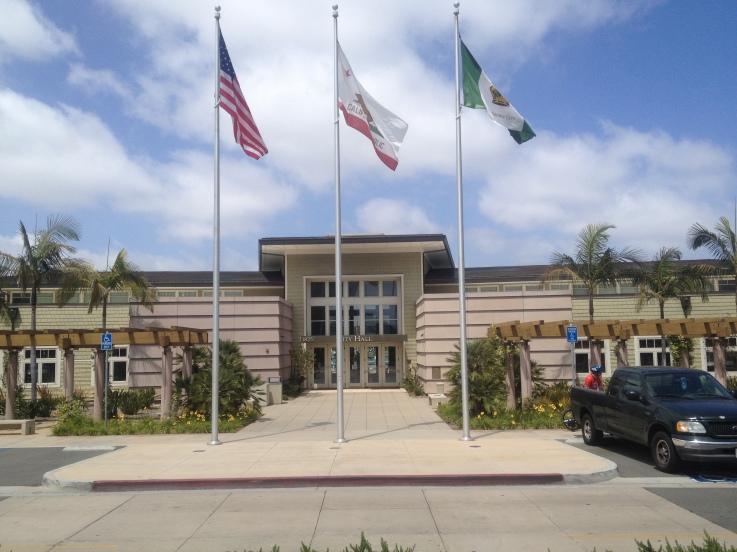City Council Meeting – February 2, 2016
 The state of the city streets dominates the council agenda for its February 2 meeting. Council members will weigh in on a number of issues from a local and statewide perspective.
The state of the city streets dominates the council agenda for its February 2 meeting. Council members will weigh in on a number of issues from a local and statewide perspective.
The council will consider parking proposals for the John D. Spreckels Center, a speed camera for the Third and Fourth Street corridor, installation of a storm drain along I Avenue and what it expects from its lobbyist in Sacramento. Of particular interest to residents is a bill that would make it easier to transfer state highways from state to local control.
Now under construction, the Spreckels Center will require additional parking. The original plan called for installing diagonal parking to create four more spaces on Seventh Street.
This was rejected because it would impede the high volume of bicycle traffic there. The Center is being built across the street from Coronado High School. Village Elementary and Coronado Middle School are nearby.
Six alternatives to perpendicular parking have been suggested:
Creating a perpendicular parking stall in the triangular lot across the street, a parallel space in red zone in the same lot, a parallel space on D Avenue in front of the handicapped parking zone, a diagonal space on D Avenue just south of Olive Avenue, one on Sixth Street between the alley and the Fire Station, or one on Orange Avenue in front of the Police Station.
There will be a public hearing to discuss installing a forty-eight inch storm drain and related improvements along I Avenue from Fourth Street to the San Diego Bay to alleviate flooding near the intersection of Fourth Street and Alameda Boulevard.
The project requires a mitigation negative declaration (MND) of environmental impact and a coastal permit. The council is being asked to approve both so the project can move forward.
The council approved the design this summer and approved the budgeted $1.35 million from a number of sources: Highway User Tax Account, Regional Transportation Congestion Improvement Program, storm drain fund and toll funds.
It will consider pursuing legislation to allow an automated speed camera in the Third and Fourth Streets Corridor. City Councilman Bill Sandke suggested the camera as a way to improve safety in a residential neighborhood where a number of traffic accidents have occurred. In less than two years one man was killed and two teenagers were seriously injured in three separate incidents.
A number of studies, including one by the Insurance Institute for Highway Safety (IIHS), have shown that “speed cameras have substantially reduced speeds,” according to the staff report.
Legislation is required because the California Vehicle Code prohibits speed cameras. There are no bills before the legislator at this time; however San Francisco is interested in installing speed cameras and hopes to find a legislator to sponsor one this year.
That may prove difficult. While the studies indicate that speed cameras and other automated traffic enforcement work, they are unpopular with motorists as our region’s recent experience with red light cameras shows.
Many viewed them as speed traps and fought to have them removed. A number of communities in San Diego County, including El Cajon, Poway and Escondido did. Others (Encinitas and Vista) kept theirs despite public pressure to remove them.
The backlash against red light cameras may make it more difficult to find a legislator to carry a bill for speed cameras, the staff report noted.
Finally the city council will set legislative policy guidelines for 2016. As always the focus is on legislation that directly affects the City of Coronado.
Currently the city’s representative in Sacramento is following legislation that will make it easier for the state to relinquish control of state highways (e.g. Orange Avenue and Fourth and Third Streets) to local jurisdictions, SB 254. While the city does not oppose transfers per se, it wants to insure that it can stop the process if the terms do not benefit the city.
It is also following a bill that calls for the transfer of all “submerged lands currently under the control of the State Lands Commission to the Port of San Diego.” These include San Diego Bay to Zuniga Jetty, south of Point Loma. The Port supports the legislation (AB 729) because it believes such a transfer offers economic and environmental benefits for the bay.
The meeting begins at 4pm in the council chambers at 1825 Strand Way.




